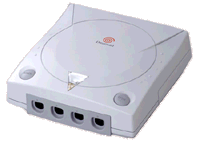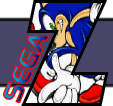 Here's some technical information and specifications of the powerful SH-4 RISC microprocessor that will be used
for the Sega Dreamcast (Note: the Sega Saturn used the Hitachi SH-2 RISC microprocessor).
Here's some technical information and specifications of the powerful SH-4 RISC microprocessor that will be used
for the Sega Dreamcast (Note: the Sega Saturn used the Hitachi SH-2 RISC microprocessor).
Description/Introduction:
The SH7750 (SH-4 series) is a high performance, cost-effective, 2 issue superscalar
RISC microprocessor for embedded applications. The SuperHTM architecture is the leader
in code density among RISC microprocessors, reducing memory costs in embedded
applications. It features a 64-bit external data bus, a 16-bit fixed-length instruction
set and a 128-bit vector graphics engine.
The SH7750 is used in consumer, computing, multi-media, and communication markets.
Applications include handheld PCs, sub-notebook PCs, Internet appliances, set top boxes,
and game machines. The device can be paired with an ASSP companion device for a low cost,
low IC count, and differentiated system.
Hitachi optimized the SH7750 MMU, cache size, and peripheral mix for Windows CE
applications.
Features:
- General
SH-4 Block Diagram
![[Click to Expand]](dreamcast_hitachi_screenshot_1.gif)
Hitachi SH-4 RISC Microprocessor
![[Click to expand]](dreamcast_hitachi_screenshot_2.gif)
-
200 MHz/360 MIPS at 3.3V I/O, 1.8V internal
-
16 x 32-bit general purpose registers
-
256 pin LBGA
-
CPU
-
Code compatible with SH7000/7600/7700 series
-
16 x 32-bit general purpose registers
-
32 x 32-bit single-precision floating point registers
or 16 x 64-bit double-precision floating point registers
or 4 x 128-bit single-precision vector registers and register matrix
-
16-bit fixed instruction length for high code density
-
32 x 32 + 64 --> 64 bits multiply-accumulate unit for special functions such as software modems
-
MMU Designed for Windows¨CE 1KB, 4KB, 64KB, and 1MB page sizes, 64-entry, fully associative UTLB
-
4 entry, fully associative ÁITLB
-
5 stage pipeline
-
Memory
-
On-chip cache, 8KB instruction and 16KB data
-
Write back or write through, selectable by page
-
Low voltage cache to reduce power consumption
-
On-chip bus state controller allows direct connection to DRAM, SDRAM, SRAM, ROM, and Flash ROM
-
8, 16, 32, or 64-bit data bus support
-
Peripherals
-
DMA, 4 channels
-
Timers, 3 channels x 32-bits
-
Watchdog timer
-
Realtime clock
-
PCMCIA control logic
-
Serial communications interface, 1 channel
(asynchronous/synchronous, with smart card interface)
-
Serial communication interface 1 channel
(asynchronous, with 16 byte transmit and receive FIFOs)
-
PLL with x1/8, x1/6, x1/4, x1/2, x3/4, x1, x3/2, x2, x3, x6 external clock capability
-
Interrupt controller
-
General purpose I/O, 16 lines
-
Dynamic power control
-
Low power modes: sleep and standby
-
Peripheral turn off capability
-
User break controller for on-chip debugging
-
Hardware:
-
Hitachi E10 emulator
-
Hitachi D9000 development platform for SH7750 and Windows CE
|





